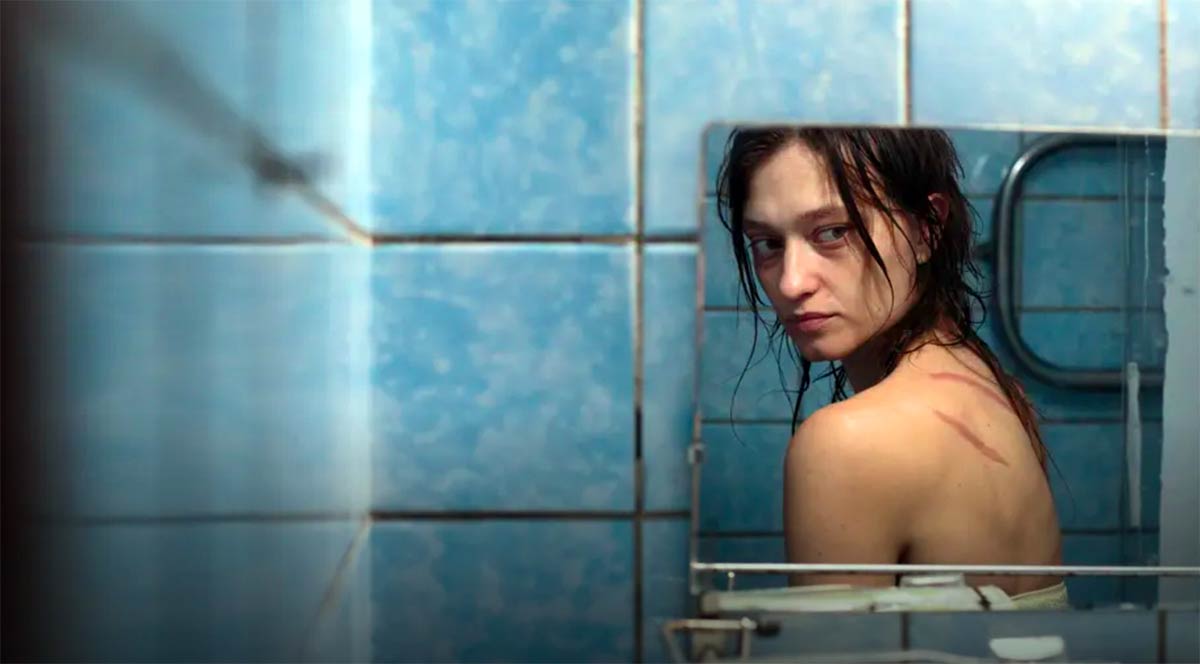Though shot and set prior to the Russian invasion, by dint of being a Ukrainian picture detailing the aftermath of a woman soldier’s assault in the Donbas, “Butterfly Vision” lays claim to uniquely wretched timeliness at this year’s Cannes. What is an impressive if formally flawed first film from Maksym Nakonechnyi earns some emotional weight vis-a-vis present events: the Ukrainian flags of blue and white, flown with unsparing pride across Nakonechnyi’s images, bear the immediate frisson of beleaguered resistance, and that women Stateside presently face unprecedented threats to their bodily autonomy only compounds the miserable resonance. It’s a technically uneven thing — Nakonechnyi, demonstrating his lesser experience, chucks a lot at the wall to see what sticks — elevated by a tremendous central performance by Rita Burkovska, echoing Adi Carauleanu in “4 Months, 3 Weeks and 2 Days”.
29-year-old Lilia is a soldier in the Ukrainian military. Nicknamed “butterfly” — it’s the titular role! — she operates aerial reconnaissance drones in the war-torn east, spying on high-value targets and mapping out Russian movements. We meet her after an operation has gone awry, with Lilia being captured and chucked inside a makeshift gulag for two months. Released from the camp (aptly spray-tagged “welcome to hell”) at the beginning of the picture, she quietly struggles to come to grips with her internment. That she’s hailed as a national hero on her return, a widely paraded symbol of Ukrainian women’s resistance, only weighs further: heavy are the shoulders that bear the nation, after all. Frictions arise within her family, rippling from the core like deep red spider-veins: she’ll no longer be touched by, let alone sleep in the same bed with, her husband, and recoils at her family’s understandable mollycoddling.
READ MORE: Cannes 2022: ‘Triangle of Sadness’ Wins The Palme d’Or [Full Winners List]
The twist in the tale comes around a third way through “Butterfly Vision,” when Lilia discovers that she’s pregnant, resulting from a largely unseen prison assault. Gradually and suddenly, she retreats into herself, her instinct for self-preservation taking hold. The first thought is towards abortion — but for her body to be invaded anew, prodded and picked apart atop a cold metal table, becomes too much to take. She runs. One might presume the product of such a grievous ordeal germinating inside her to be something more akin to a tumour, a malignant growth to be destroyed as quickly as possible, but no: to her family, friends, and the camera alike, Lilia is enigmatic, difficult to pick, multifaceted. This isn’t your usual post-pregnancy drama, but something all the more complex — even if the constituent twists and subversive beats don’t always land.
You get the sense that Nakonechnyi is pointed trying to get away from the appreciably morose, slow-burn trappings of stories centrally interested in sexual violence (think: the aforementioned “4 Months,” with its unflinching take on multitudinous cruelty, or Audrey Diwan’s best-in-fest Venice 2021 debutant “L’Événement”). For the most part, cinematographer Khrystyna Lizogub shoots this as a conventional drama, her camera still and close, lingering on sullen expressions, waiting for breaks in the front.
But a couple of formal inflections are chucked in by Nakonechnyi with varying results. Shorter cuts of TV news footage and Instagram reels, covering Lilia’s return to Ukraine and, later, a court case central to the third act, are a fine enough way of delivering exposition but feel redundant, breaking what is otherwise a nice cadence in Ivor Ivezić and Nakonechnyi’s edit. For fleeting seconds, driven by painful moments in the present, the picture glitches into the past, delivering terrible glimpses of Lilia’s torture. It reveals little, and to great effect: you see enough to confirm the worst, but we’re left to color in the lines, images surely more harrowing born of our minds than anything Nakonechnyi can reasonably capture without leaning into tasteless exploitation.
Central to the success of “Butterfly Vision,” however, is Burkovska: she embodies Lilia with silent rage, her poise broken in fleeting moments, the steely facade dropped for mere seconds at a time. These moments betray everything. Invested with heroism by the public at large, this woman is as infallible as us all, crippled by the weight of expectation and the weeping lesions of the past. There isn’t a showy awards moment, nor something that could come off as an easy trailer sell. Hence why it’s brilliant: Burkovska’s quiet, brittle resilience imparts everything we need to know. [B]
Follow along with all our coverage from the 2022 Cannes Film Festival.





